Portret de Voluntar – Melanie (Belgia)
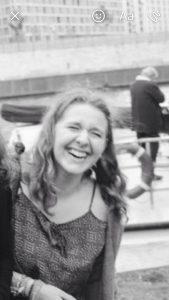 Hello! 🙂 My name is Melanie and I’m 18 years old. I am German and Polish, but I live in Belgium, where I have spent nearly all my life. Now, I just finished my school but I didn’t know what I wanted to do – study? But what, how, where? All I knew was that I wanted to go out and see a new place, and most importantly meet new, wonderful people… so when finally I came here in Izovarele to Curba de Cultura, I knew that it was really the best decision to do this EVS. Even though at first I was a bit nervous because it was the first time I’m leaving my family and my home etc. for so long, every single person that I met was so welcoming and simply kind that soon I felt super comfortable in this beautiful place. Now I’m simply exited to live here, explore, get to know you, the locals – your culture, what you love, how you think and see the world – and together with the other volunteers do all kinds of activities where we can also share a bit of ourselves! So well I’m sure we will have plenty of time during these 6 months for all of this, and I’m already really looking foward to it. See you at Curba! Melanie
Hello! 🙂 My name is Melanie and I’m 18 years old. I am German and Polish, but I live in Belgium, where I have spent nearly all my life. Now, I just finished my school but I didn’t know what I wanted to do – study? But what, how, where? All I knew was that I wanted to go out and see a new place, and most importantly meet new, wonderful people… so when finally I came here in Izovarele to Curba de Cultura, I knew that it was really the best decision to do this EVS. Even though at first I was a bit nervous because it was the first time I’m leaving my family and my home etc. for so long, every single person that I met was so welcoming and simply kind that soon I felt super comfortable in this beautiful place. Now I’m simply exited to live here, explore, get to know you, the locals – your culture, what you love, how you think and see the world – and together with the other volunteers do all kinds of activities where we can also share a bit of ourselves! So well I’m sure we will have plenty of time during these 6 months for all of this, and I’m already really looking foward to it. See you at Curba! Melanie
Bună! Eu sunt Melanie și am 18 ani. Sunt nemțoaică și poloneză, dar trăiesc în Belgia unde mi-am petrecut aproape întreaga viață. Acum, am terminat școala și nu știam ce vreau să fac – să învăț? Dar ce, cum, unde? Tot ce știam e că vreau să ies, să văd locuri noi și cel mai important, oameni minunați… prin urmare când am ajuns în cele din urmă la Curba de Cultură, am știut că a fost cea mai bună decizie să fac acest SEV. Chiar dacă la început eram puțin emoționată pentru că îmi părăseam familia și casa pentru prima dată, pentru o perioadă atât de lungă. Fiecare persoană pe care am întâlnit-o a fost atât primitoare și binevoitoare încât curând m-am simțit super confortabil în acest loc minunat. Acum sunt încântată să trăiesc aici, să explorez și să cunosc localnicii – cultura, ce iubesc, cum gândesc și să văd lumea – și împreună cu alți voluntari să facem activități în care putem împărtăși un pic din noi înșine! Sunt sigură că vom avea timp destul în aceste 6 luni și abia aștept.
Ne vedem la Curbă!
Melanie se află în România pentru o perioadă de 6 luni, din septembrie 2017 până în Februarie 2018 în cadrul proiectului Behind Borders (ref nr 2017-2-BE05-KA105-002181), proiect co-finanțat de Uniunea Europeană prin Programul Erasmus+ și implementat în România de Asociația Curba de Cultură.
First day of school – Prima zi de școală
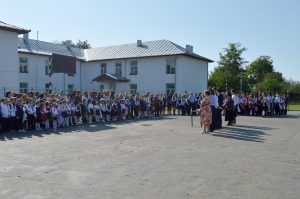 Blessings, good wishes, bouquets of flowers and festive clothes – the first day of school is a celebration day in Romania. But is it like that all around the world? We asked our EVS volunteers to tell us how do they find the first Romanian school day comparing to their experience from home.
Blessings, good wishes, bouquets of flowers and festive clothes – the first day of school is a celebration day in Romania. But is it like that all around the world? We asked our EVS volunteers to tell us how do they find the first Romanian school day comparing to their experience from home.
Urări de bine, binecuvântări, buchete de flori și haine festive – prima zi de școală în România e o zi de celebrări. Dar e la fel peste tot în lume? Noi i-am întrebat pe voluntarii noștri SEV cum li se pare prima zi de școală în România în comparație cu țările lor.
It was really interesting to discover this part of the culture that I’ve never seen before. I was impressed of the involvement of the parents during this first day of school. /…/ In France, it’s totally different. We don’t have a ceremony for the start of the school. (Estelle, France)
A fost foarte interesant să descopăr această parte a culturii pe care nu o mai văzusem. Sunt impresionată de implicarea părinților în această zi. /…/În Franța e complet diferit. Nu avem o ceremonie de început de an școlar. (Estelle, France)
In Croatia for the first day of school we go to buy new books and notebooks for new school year, new pencils, erasers, and other things we need. We go with our parents, mostly moms because dads are always working. We are excited as every kid is for their first day of school, dressed well, but not that fancy as Romanians. (Martina, Croatia)
În Croația pentru prima zi de școală mergem să cumpărăm cărți și caiete pentru noul an școlar, creioane, radiere și alte lucruri de care avem nevoie. Mergem cu părinții, de cele mai multe ori cu mamele, căci tații sunt mereu la muncă. Suntem entuziasmați ca orice copil în prima zi de școală, îmbrăcați frumos, dar nu atât de facy precum românii. (Martina, Croatia)
In Spain, they keep trying to separate the educational system from the politics, religion and Security Forces of the State (although they are connected in not a visible way). They will only attend to some educational event if they are invited – and in this case usually there are protests or riots, especially in Universities – or if they are directly related with the course. (Alba, Spain)
În Spania, se încearcă separarea sistemului educațional de politică, religie și de sistemul de securitate internă (chiar dacă ei sunt conectați într-un mod invizibil). Reprezentanții acestor categorii iau parte doar dacă sunt invitați – iar aceste contexte stârnesc de obicei proteste și revolte, în mod special în Universități – ori dacă au legătură directă cu studiile. (Alba, Spain)
We do not have such a big event as here in Romania. /…/ Children usually cry on the first day and spend only an hour in the classroom, then the teacher or the headmaster makes a little fun for the kids with music, dance or some games. (Roman, Czech Republic)
Nu avem un eveniment așa mare ca în România /…/ Copii plâng de obicei în prima zi și petrec doar o oră în sala de clasă, apoi profesorul ori directorul face ceva distractiv pentru copii, muzică, dans și ceva jocuri. (Roman, Czech Republic)
In Argentina /…/ all the students go to their schools, raise the Argentinian flag for the first time in the year, something we do every day during the school year, and then we all sing the Argentinian anthem. /…/ We bring flowers to the teachers at the end of the school year (and if the teacher deserves it). (Gabriel, Argentina).
În Argentina /…/ toți elevii merg la școală, se ridică steagul argentinian pentru prima dată în acel an școlar, lucru care se va face zilnic după aceea și cântăm cu toții imnul argentinian. /…/ Noi aducem flori profesorilor doar la finalul anului școlar (dacă profesorii le merită). (Gabriel, Argentina)
I wasn’t surprised to see the priest, even though in Italy it would also be weird. Italy is a very catholic country but it is more and more multicultural, especially in the cities, and the relationship between church and state is different from Romania. (Isabella, Italy)
Nu am fost surprinsă să văd preotul, chiar dacă acest lucru ar fi ciudat în Italia. Italia este o țară foarte catolică, dar e din ce în ce mai multiculturală, în orașe în mod special, și relația dintre stat și biserică e diferită de cea din România. (Isabella, Italy)
In comparison to the attended ceremonies, the pupils wear their daily clothes and meet their teacher in the classroom. Together with the teacher the classes go to the schoolyard or the school hall, where the ceremony takes place. Besides this, only the parents of the 1st grade kids are invited. Commonly the people sing a song with movements, which is the beginning of the ceremony. (Stefanie, Lichtenstein)
Prin comparație, elevii poartă hainele de fiecare zi și se întâlnesc cu profesorii în clase. Împreună cu profesorul clasele merg în curtea școlii sau în sala de sport unde are loc ceremonia. Pe lângă asta, doar părinții claselor 1 sunt invitați. De obicei se cântă ceva cântece cu mișcări, ca parte a ceremoniei de început. (Stefanie, Lichtenstein)
I noticed was that everybody had flowers or little bags with them to give as presents for their teachers. In my schools the teachers could only dream about something like this! (Melanie, Belgium)
Am observat că toți aveau flori ori plăsuțe cu cadouri pentru a fi dăruite profesorilor. În școala mea profesorii pot doar să viseze la așa ceva! (Melanie, Belgium)
From all those perspectives, we can understand better our own culture and its’ specifics. Things that seem normal to us, some might be incredible, weird, surprising to others. And that is one of the charms of interculturality that our dear EVS are bringing in the life of Izvoarele.
Urmărind aceste perspective ne putem înțelege mai bine cultura și specificitățile ei. Lucruri care par normale pentru noi, pot fi incredibile, ciudate sau surprinzătoare pentru alții. Și acestea este unul dintre farmecele interculturalității pe care dragii noștri voluntari SEV îl aduc comunității din Izvoarele.
Portret de voluntar – Stefanie (Liechtenstein)
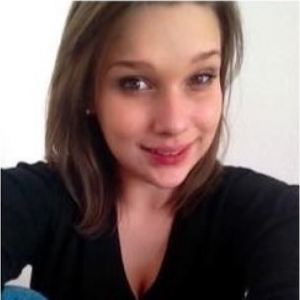 Hi! My name is Stefanie and I am from Liechtenstein. Before coming here to participate in the project, I finished my studies at the college of education in Basel, Switzerland, to become a primary school teacher. Due to this fact, I decided to take a gap-year and go to a foreign country to gain new experiences before I am looking for my first job as a primary school teacher.
Hi! My name is Stefanie and I am from Liechtenstein. Before coming here to participate in the project, I finished my studies at the college of education in Basel, Switzerland, to become a primary school teacher. Due to this fact, I decided to take a gap-year and go to a foreign country to gain new experiences before I am looking for my first job as a primary school teacher.
Salut! Eu sunt Stefanie și sunt din Liechtenstein. Înainte de a lua parte la acest proiect am studiat la coelgiu in Basel, Elveția pentru a deveni profesor în învățământul primar. Din acest motiv am decis să îmi iau un an liber și să plec în altă țară pentru a dobândi o nouă experiență înainte să caut primul loc de muncă ca învățător.
After having read the description of the project, I was totally fascinated because I like the idea of bringing nonformal education and interculturality to young people. I regard it as an exciting and various job where you get in touch with other people.
I am really looking forward to make new experiences and extend my knowledge. On top of it, it would be quite exciting to get to know to new people, a new culture and another country.
După ce am citit descriere proiectului am fost fascinată total, deoarece îmi place ideea de a aduce educația nonformală și interculturală tinerilor. Îmi pare a fi un loc de muncă unde sunt în contact cu o mulțime variată de alți oameni.
Chiar sunt foarte dornică să încerc aceste noi experiențe și să îmi îmbunătățesc cunoștințele. În plus va fi foarte incitant să cunoasc alți oameni, o altă cultură și o altă țară.
Stefanie se află în România pentru o perioadă de 9 luni, din septembrie 2017 până în mai 2018 în cadrul proiectului Volunteer for Rural Communities (ref nr 2017-2-LI01-KA105-000049), proiect co-finanțat de Uniunea Europeană prin Programul Erasmus+ și implementat în România de Asociația Curba de Cultură.
Nu vorbesc româneşte – I do not speak Romanian
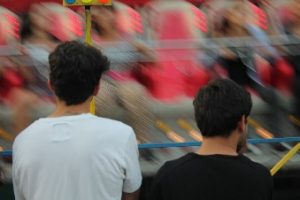
The feeling when people speak Romanian to you – Sentimentul când oamenii îți vorbesc în română
So you are so excited. You arrived in Romania and you are starting your EVS, you spend your time in Curba or with the other volunteers, English may look complicated but you can communicate with them, suddenly you realize you’re thirsty, but you’re lucky, you have a shop just in front of the organization house, you cross the street, enter the shop and… Oh snap, you have no idea of Romanian. Don’t worry, here you have a small guide made by my experience.
Ești super entuziasmat. Ai ajuns în România ți-ai început EVS-ul, petreci timp la Curbă ori cu alți voluntari, limba engleză pare complicată dar puteți comunica și dintr-o dată realizezi că ți-e sete, dar ai noroc, este un magazin chiar peste drum de organizație, traversezi, intri și… oh, nu ai nici cea mai vagă idee despre limba română. Nu te îngrijora ai aici un mic ghid creat din experiența mea proprie.
So, first of all, read the title, that’s now your god. ”Nu vorbesc româneşte” means ”I don’t speak romanian”. Romanian people will understand it, also they will talk with you anyway, maybe closer to you, louder or slower but you still don’t understand them, so next step: Da (which means yes) repeat it, constantly, you don’t understand what they are telling you so you just keep saying da and laugh whenever they laugh, that’s the best trick.
În primul rând, citește titlul, acesta este noul tău dumnezeu. “I do not speak Romanian” înseamnă “Nu vorbesc românește”. Românii vor înțelge, dar vor vorbi mai departe, poate mai aproape de tine, mai tare sau mai rar, și în continuare nu îi vei înețelege, deci trecem la următorul pas: Da, repetă da, constant, nu înțelegi ce îți spun ei așacă spune mai departe da, și râde ori de câte ori ei râd, cel mai bun truc.
If you’re lucky enough and your native language comes from latin also you will have some word that you can understand randomly, when you understand a word, repeat it and say yes with your head, fantastic, you’re having a perfect conversation now.
Dacă ești suficient de norocos și limba ta maternă vine din latină, vei înțelege niște cuvinte pe ici pe colo, când înțelegi un cuvânt, repetă-l și aprobă cu o mișcare a capului, fantastic, ai o conversație minunată acum.
But now back to the begining, you are in the shop, choose wisely, the common brands has the same language in every country, if you are looking for something different you just need to read the name on it, wait till the cashier stop laughing because you probably said something completely unrelated to what you want and then point at whatever you want. Now is the moment to pay, oh yes, plastic money, you forgot it, it’s always nice to use it the first days, you give the products to the cashier and she says to you ”sapteleişicincizecibani” (or something like that) you enter in full panic mode.
Să ne întoarcem, ești la magazin, alegi cu atenție, mărcile faimoase sunt la fel în fiecare țară, dacă cauți ceva diferit, doar citește ce scrie pe ambalaj, așteaptă până vânzătorul se oprește din râs căci probabil ai spus ceva fără legătură și apoi arată cu degetul spre ceea ce îți dorești. Acum e momentul să plătești, oh da, bani de plastic, am uitat, sunt interesanți în primele zile, dai produsele vânzătorului și îți spune ”sapteleişicincizecibani” (sau ceva asemănător) și începi să te panichezi la maximum.
Now you have two options, first, take a random note and give it to the cashier, if their hands still extended don’t worry put more random notes on it till it’s okay.
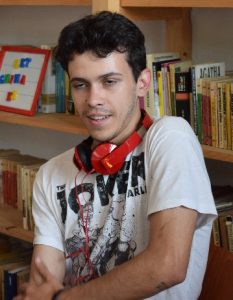
When the cashier says the price in Romanian – Când vânzătorul îți spune prețul în română
The second option is to try your Romanian again ”scrieți prețul, vă rog” (Write the price please) they will show you the calculator and the job is done.
Acum ai două variante, prima: iei o bancnotă la întâmplare o dai vânzătorului, iar dacă mâna e încă întinsă, nu te îngrijora, mai pune bancnote la întâmplare până e ok.
A doua variantă este să îți încerci abilitățile de limbă română din nou ”scrieți prețul, vă rog”, ei îți vor arăta ecranul calculatorului și treaba e gata.
So this is a small guide to help your romanian conversations. The last advice I can give you is to learn the language and that the regular water is ”Apă plată” if you don’t want the sparkly one.
See you in the store.
Ăsta e micul meu ghid care să te ajute cu conversațiile în limba română. Un ultim sfat pe care ți-l pot da este să înveți limba și apa normală este denumită ”Apă plată” dacă nu o vrei pe cea cu bule.
Ne vedem la magazin.
Gabriel este în România pentru o perioadă de 12 luni, din iuliie 2017 până în iunie 2018, în cadrul proiectului Izvoarele Unveiled [2016-3-RO01-KA105-035584] proiect co-finanțat de Uniunea Europeană prin Programul Erasmus+ și implementat în România de către Curba de Cultură.
Adventures with the minibus in Izvoarele
Coming from a capital such as Madrid and not having a driving license, it was normal that I was quite concerned about the public transport. But things are different now in Izvoarele. It is a small place, so the public transport is reduced with a strict schedule (and sometimes a bit random). The first thing I asked Sorin was “Where are the public transport schedules and the bus and train stops?”, so he showed me the paper schedule that is in the office.
Venind dintr-o capitală precum Madrid și fără un permis de conducere, era normal să fiu destul de îngrijorată de transportul public. Dar lucrurile sunt diferite în Izvoarele. E un loc mic, prin urmare transportul public este redus și cu un orar strict (dar câteodată la întâmplare). primul lucru pe care l-am întrebat pe Sorin a fost “Unde găsesc orar autobuzelor, precum și stațiile de autobuz și tren?” iar el mi-a arătat orarul lipit pe perete în birou.
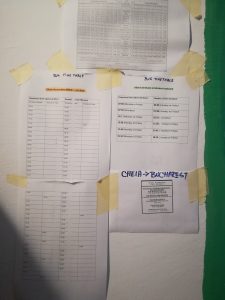
The first day that I had to use the public transport was to go from Schiulesti to Curba the Cultura, and it was so confusing for me. Isabella and I were together, so at least we had some fun with our confusion. Estelle drove us until Homoraciu bus stop, and we just had to take one bus to arrive at Curba de Cultura.
În prima zi în care am folosit transportul în comun am mers din Schiulești către Curba de Cultură și a fost puțin confuzant. Eram cu Isabella așa că cel puțin ne-am distrat. Estelle ne-a dus cu mașina până la Homorâciu în stație și de acolo aveam de luat un singur autobuz pentru a ajunge la Curba de Cultură.
We got into the van that said “Valenii de Munte – Maneciu” (also the ones which go to Bucuresti, Ploiesti or Cheia). We saw through the window the Amo Pensiunea, then Curba de Cultura, and when we were approaching the church, our stop, we had a small problem: “How do we get out of the bus?” None of the passengers wanted to get out in Izvoarele stop, so they did not move. “Ok. So… we just passed our stop… now what? There is not a stop button or something?”, and yes, Isabella and I get out of the bus in Maneciu. We were so lost that we even had to call Kristina. Somehow, we managed to get the bus from Maneciu and to get out in Izvoarele. We discover that if you want to get out, you have to stand up inside the van (but sometimes it does not work and the driver passes the stops, somehow we ended up once in Malu Vanat).
Am urcat în microbuz ce avea scris “Valenii de Munte – Maneciu” (același care vine de la București, Ploiești spre Cheia). Am văzut pe geam pensiunea Amo, apoi Curba de Cultură și când ne apropiam de biserică unde e stația, am avut o problemă: “Cum coborâm?” Nici unul dintre pasageri nu cobora acolo, deci nu s-au mișcat. “Ok… așa am ratat coborârea… și acum ce facem? Nu există vreun buton de stop ori ceva?” așa se face că eu și Isabella am coborât în Măneciu. ne pierduserăm așadar am sunat-o pe Kristina. cumva am reușit să luăm alt microbuz din Măneciu și să coborâm la Izvoarele. Am descoperit că pentru a coborî trebuie să te ridici în picioare (dar nici așa nu funcționează întotdeauna și odată am coborât în Malu Vânăt.
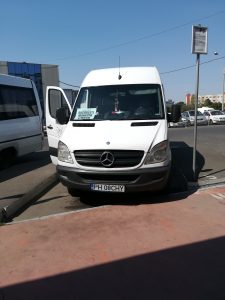
But we also met some funny drivers and had funny moments. One of them made a joke on me! I got into the van; showed him my monthly ticket, and then he took it and… made a movement of throwing it through the window!! There is another driver, “our driver” that we almost meet him every time we go by bus. He lives also in Schiulesti, and one day, we were waiting for the bus to return from Curba (and no bus came from the schedule)… I saw him driving the van and raised my hand to stop him; we got inside the van and showed him my ticket, but he rejected it… He was just returning home from his work and took us for free to almost our home! He is really nice!
Însă am întâlnit și șoferi amuzanți și am avut momente amuzante. Unul dintre ei mi-a jucat o farsă! Am urcat în microbuz, i-am arătat abonamentul, l-a luat și s-a prefăcut să îl aruncă pe geam!!! Apoi un alt șofer, “șoferul nostru” pe care îl întâlnim aproape de fiecare dată. El loicuiește de asemenea în Schiulești și într-o bună zi în timp ce așteptam autobuzul să ne întoarcem de la Curbă (nici nu autobuz nu venea conform orarului)… l-am văzut conducând, i-am făcut cu mâna și a oprit. I-am arătat abonamentul dar l-a respins… El doar se întoarcea acasă de la muncă și ne-a dus și pe noi gratuit până aproape acasă! Este foarte drăguț.
Alba este în România pentru o perioadă de 12 luni, din iunie 2017 până în mai 2018, în cadrul proiectului Izvoarele Unveiled [2016-3-RO01-KA105-035584] proiect co-finanțat de Uniunea Europeană prin Programul Erasmus+ și implementat în România de către Curba de Cultură.
Portret de voluntar – Martina (Croația)
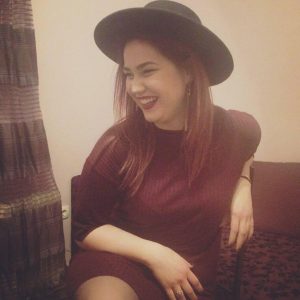
Hi, my name is Martina, I’m 22 years old and I came from Croatia. I studied political science in Bosnia and Herzegovina. I came here because I took a pause between bachelor and master degree, and wanted to go somewhere at that time, so I saw the project and applied. I really liked the project and I was so happy when they accepted me.
Bună, eu sunt Martina, am 22 de ani și vin din Croația. Am studiat Științe Politice în Bosnia și Herțegovina. Am venit aici pentru că am luat o pauză între licență și masterat și voiam să merg undeva în perioada asta, prin urmare am văzut proiectul și am aplicat. Chiar îmi place proiectul și am fost foarte fericită când am fost acceptată.
I can’t wait to start to work and meet you all! Romanian people are so nice, and the language is super interesting so I want to learn it so I can hang out with you and is always good to know more languages. I stay in Romania for an half of year, and I’m excited to explore Romania.
De abia aștept să încep activitățile și să vă întâlnesc pe toți! Românii sunt amabili, iar limba este super interesantă, deci vreau să o învăț ca să pot petrece cât mai mult timp cu voi. În plus nu strică niciodată să știi mai multe limbi. Voi sta în România pentru o jumătate de an și sunt foarte dioarnică să explorez România.
Martina se află în România pentru o perioadă de 6 luni, din septembrie 2017 până în februarie 2018 în cadrul proiectului Volunteer to Grow (ref nr 2017-1-HR01-KA105-035157), proiect co-finanțat de Uniunea Europeană prin Programul Erasmus+ și implementat în România de Asociația Curba de Cultură.